15 Puppy Potty Training Problems Solved
I often get messages from people that are very frustrated as a result of puppy potty training problems. They have followed all the standard advice and yet their puppy pees in the house more than he pees outdoors!
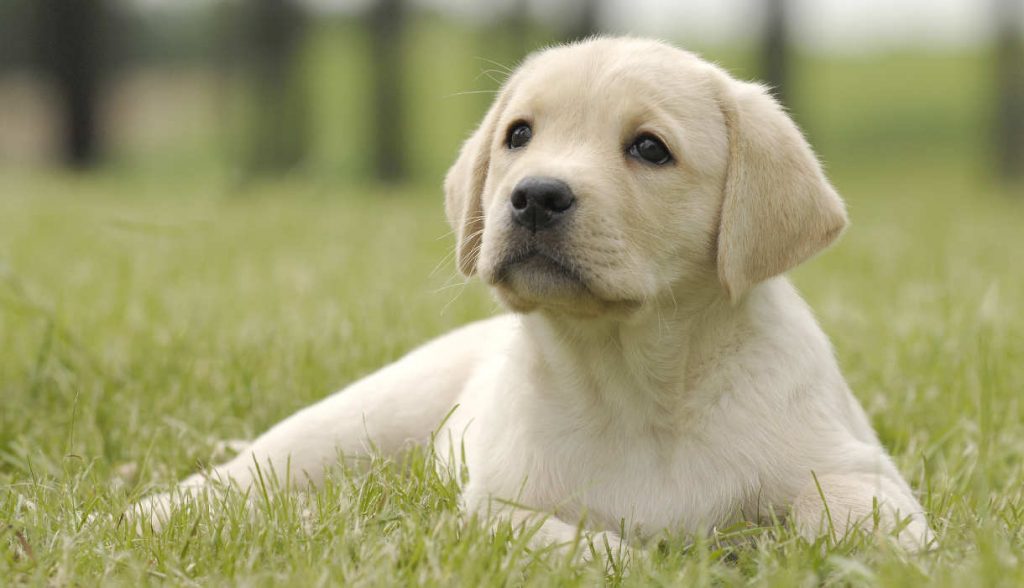
Fortunately, most of these problems can be solved with a few tweaks to your routine. And with the right system your puppy will be potty trained in no time at all.
- How well are you supervising your puppy?
- Puppy crate training errors
- Unrealistic puppy potty training schedules
- How clean is your rug really?
*The products linked in this article were carefully selected by me to be shared on The Labrador Site. If you decide to purchase using the links provided, you’ll be supporting our site by allowing us to earn a small commission on that sale. This is at no extra cost to you.
The causes of potty training problems in small puppies can include insufficient supervision, crate training mistakes, over ambitious routines, the wrong cleaning products and even bladder infections. But essentially, fast, efficient puppy potty training depends on setting our puppies up to win. It’s all about building great habits for the future.
Each family and puppy is different but fortunately in nearly every case, we can pin potty training difficulties down one of the following problems.
#Problem 1: The puppy is unsupervised when his bladder is filling up
Puppies have very little control over their bladders, so to begin with your puppy is not going to wait until his bladder has filled right up, before depositing the contents on your floor.
You may want him to empty his bladder in the yard, but he is going to empty his bladder as soon as it starts to feel a bit uncomfortable. That might be a lot sooner than you think it should be. And you won’t get much warning. He may look a bit distracted or start to sniff around briefly. And that’s about it. If you don’t spot the signs, a puddle will soon follow.
The answer?
You need to either supervise your puppy very, very closely when his bladder is beginning to fill. Or put him somewhere where he will try very hard not to empty it. Such as a small crate, or being held in your arms or cuddled on your lap. Once that ‘bladder fill level’ is past half way, you are in ‘danger’ territory. You need to be actually watching your puppy like a hawk, or cuddling him, or he needs to be in his crate for a few minutes.
“But, but” you cry “how am I supposed to know when his bladder is filling up!”.
Working out when your puppy’s bladder is getting full
True enough, there is no ‘fill gauge’ on your puppy, to tell you when his bladder is past the half way mark, no little red light, and no warning buzzer. That makes it hard for you. And it’s why accidents happen.
The best way to keep accidents to the absolute minimum, or even avoid them altogether, is to figure out how full your puppy’s bladder is, based on how often he empties it. So, if your puppy empties his bladder every twenty minutes, then ten minutes is the longest you can take your eyes off him for, after he has emptied himself in the backyard.
Reducing supervision
Once he is able to last an hour between pees, then you may be able to reduce supervision for half an hour after his last pee. Not everyone wants to use a crate and we’ll look at coping without one in a moment, but many people do use ‘crate time’ for those periods when a puppy’s bladder is filling up and they cannot supervise him. And that brings us to reason 2 because problems can arise when a crate is too large.
#Problem 2: your crate is too big
Many people put their puppies in a crate at night, or when they can’t watch him for short periods during the day, because they have been told that the puppy won’t pee in his own bed. Only to find that he pees right there inside the crate! What’s that about?
Before you kick your crate out of the house, hold on a second. This does not mean that crate training doesn’t work. Unless you are crating your puppy for too long (and we’ll look at that in a moment) in all probability, it means you need a smaller crate. This can be annoying, because crates are not cheap, and puppies soon grow out of a puppy crate.
 Short time / small crate:
Short time / small crate:
The crate that your 8 week old puppy sleeps in won’t last him much more than a couple of months. But if you are going to use crating as a potty training aid, the crate needs to be small(paid link)*. This also means that crate time must be very short. Not just because it is unethical and inappropriate to crate a small puppy for very long, but because he physically can’t wait very long once he is awake and active.
It doesn’t matter that there isn’t room for the puppy to play, because apart from the dead of night, he isn’t going to be in there for very long.
Use your crate appropriately
The puppy crate is not meant to be a place for puppies to romp and play. It is meant to be a safe and secure ‘nest’ for him to rest and sleep in at night, and for very short periods during the day. Which brings us to problem 3.
#Problem 3: you are leaving your puppy too long in his crate
Puppies will try very hard not to wet their own bed. But their efforts are limited by the puppy’s ability to hold onto the contents of his bladder. An ability that quite naturally, is somewhat limited in the early weeks of his life.
So, a crate can be a useful potty training aid, because it helps the puppy learn to hold on to the contents of his bladder that little bit longer. Provided, of course, that the wait is within the limits of his physical maturity. And many people get this proviso part wrong. The result is then a puppy that wets his bed. Sometimes this can go unnoticed by puppy parents until it has become a habit and the puppy has stopped trying to keep his bed dry.
Set your puppy up to succeed, not to fail:
Let’s face it, if you are trying your best at something, but are continually prevented from succeeding, you eventually give up trying. This can happen to your puppy too.
Don’t overestimate your puppy’s ability:
The answer is not to overestimate your puppy’s ability to hold on to the contents of his bladder (we’ll look more at that in Reason 4) and to always check your puppy’s bedding for damp patches when you fetch him out of his crate, to make sure you are succeeding. And this is actually about you and your success, more than about the puppy, he really doesn’t have much say in the matter
Check your puppy’s bedding:
So, check that bedding(paid link)*, and if the bedding in a sufficiently small crate is wet, you have left your puppy too long. If you have to leave your puppy longer than he can last without a pee, you need to leave him in a large puppy pen or puppy proof room, with puppy pads or newspaper at one end, and his bed at the other.
Bear in mind also, that a puppy can last longer at night when his metabolism drops and he is sleepy, than he can during the day when he is eating and drinking regularly and is active.
Using the crate at the right time:
Remember, the right way to use a crate is for short periods when your puppy’s bladder is starting to fill, but before it is so full that he can’t hold it any longer. Don’t waste your puppy’s ’empty bladder’ time by shutting him in his crate when he has just done a pee. This is the time when you can relax a little and enjoy his company without worrying that he is going to wet himself!
Don’t crate if you can’t keep crate time short:
If you have to leave your puppy for long stretches, crate training is not for you. If don’t have the time or concentration to supervise your puppy this closely, you need to consider having a puppy pen(paid link)*. Or puppy proof room where you put down puppy pads(paid link)* or newspaper for your puppy to pee on.
Cover the whole area to begin with. Then gradually make his toilet area smaller and smaller and eventually move it outside. We used to call this ‘paper training’. Don’t forget, puppies should never be left for long stretches shut in a cage!
#Problem 4: you are leaving your puppy too long between bathroom breaks
This problem applies to the puppy that is not in the crate at all, but is wandering about in the house. If you are having regular accidents outside the crate, you may well be leaving your puppy too long between trips to the yard. Puppies have annoyingly small bladders, and very little control over them. One of the commonest reasons for puppies to pee indoors, is that you have simply left the puppy indoors too long.
People often say to me – “but I let him out every hour!” as though that should be sufficient. And for some puppies it would be. But I have had puppies that need to pee every twenty minutes in the first week or so. It is also very easy to underestimate the time that has passed since the last trip to the backyard. Especially when you are busy. Set a timer for twenty five minutes, or forty five minutes, or whatever gap of time you think your puppy can wait, and take him outside when it goes off.
Frequent visits to the yard are time consuming but it is what it is. You have to deal with the puppy in front of you. Not try and make your puppy fit in with what someone else’s puppy is capable of.
Rest assured, he will grow and mature very fast. In just a month of so, this will be a distant memory, provided that you get good habits established now. That means putting your puppy out when he needs to go, not when you think he should need to go.
#Problem 5: you are expecting your puppy to ‘ask’ to go out
People often say to me – “but he didn’t even ask to go out – he just went right there on the floor in front of me!” Here’s the thing: most puppies do not ‘ask’ to go out. They don’t give a cute little ‘yip’ by the door like something out of a Walt Disney film. They don’t whine or scratch at the door, and some don’t even go and stand by the door. At least not for the next few months.
If you are observant, you may be able to spot the signs that your pup needs to ‘go’. Some pups will sniff around in little circles in the same place. This is especially true if they feel a bowel movement coming on. But many puppies give very little warning at all. They just squat down, and there it is. So, it is your responsibility, to decide when your puppy is likely to need a bathroom break. And to make sure he gets one. Don’t wait for him to tell you, because he probably won’t
#Problem 6: you are leaving the door open for your puppy
Many of us do this in the summer. We leave the back door open, so that the puppy can wander in and out of the yard at will. There’s nothing intrinsically wrong with this, but it can cause problems if you are not careful
Many puppies will quickly learn to find their favorite patch of grass, all by themselves. And their delighted owner is convinced they have potty trained their puppy successfully in a matter of days. But, what they have actually done, is made sure that the puppy has the opportunity to be clean. They have not taught the puppy to ‘hang on’ if that opportunity is not there. And there is a difference.
With the door permanently open, the puppy never has to wait very long. And although he has learned that there are great places to pee outside, which is good, if one day the door is shut he is likely to be caught out by a full bladder, and well, you know what happens next. I’m not saying that this (door open) method doesn’t work, it can work well, especially if the access to out doors is always available. In this case, gradually, the puppy will need to pee less often and his bladder will mature.
The main problem with this method, lies in assuming the puppy is housetrained at a very early age when really he still needs your help in reminding him, and providing access to his bathroom area. And it isn’t a great method if the puppy’s access to outside varies from day to day. If you can’t consistently leave the door open for the next three months, I don’t recommend it.
# Problem 7 you are not cleaning up effectively
Puppies have a useful instinct that encourages them to pee in places where they have peed before. This is useful because it means that once you establish a habit of going outside in your yard, or in the toilet area you have designated for your puppy, he will really want to go there again. But this instinct is a double edged sword in that it also encourages the puppy to pee indoors in places where he has had an ‘accident’ in the past.
I hasten to add, I am not suggesting that you are not cleaning up properly after your puppy. Of course you are. But there is cleaning, and then there is cleaning. You see, your puppy has an extraordinary nose. He can smell traces of urine that would be impossible for you or I to detect. And what is worse, some human cleaning agents, have chemicals in them that smell quite like urine to a puppy. So, you need to make sure that you not only mop up any accidents thoroughly. But only use cleaning products that do not contain ammonia.(paid link)*
You can buy specially designed products for clearing up puppy accidents and these are quite a good idea. Especially if your puppy is struggling a bit with this part of his education. Of course, cleaning up on washable floor is one thing, cleaning up from carpets is quite another. Which brings us to problem 8
# Problem 8 you are allowing the puppy onto your carpets
When you bring a new puppy into your life, you bring him into the heart of your family. In many homes the rooms where families spend a lot of their lives are carpeted. And this can be a problem for puppies. To a puppy, a carpet feels a lot like grass. It’s soft and spongy. Just the kind of place a puppy likes to relax and empty himself.
To make matters worse, it is almost impossible to remove all traces of urine from a carpet, to a level that the puppy cannot detect. So, if you bring your small puppy into a carpeted room he needs to be supervised every single minute. And preferably held in your arms or on your lap.
A better solution for many families is to prevent the puppy having access to carpeted areas of the house. If you want your puppy to be near you in the evening while you watch TV then use a crate. Put it next to your sofa with some nice Kongs inside it to keep him occupied is an alternative to letting him romp around at will.
#Problem 9 you are leaving the puppy outside on his own.
I know exactly how tedious it can be waiting outside for a nine week old puppy to go for a pee, when he would rather play with your shoe laces or dig up the lawn. It is very tempting, especially in bad weather, to push the puppy out into the backyard and leave him there to do his business. After all, there’s no point both of you getting cold, is there.
The problem is that most tiny puppies are very dependent on their new ‘grown-ups’ for at least the next few weeks. If you don’t go with him, he won’t relax enough to think about going to the toilet. In fact, unless he is absolutely desperate, he probably won’t go at all. The chances are, he’ll sit by the door, waiting for you to let him in again.
So, I’m afraid you need to bite the bullet. Get yourself out there with your puppy and wait with him until he does a wee, or a poo if he has eaten recently. And don’t expect it to be a two minute job, which brings us to problem ten.
#Problem 10 you are not waiting for long enough
Many people find that their puppy pees in the house, right after they bring him indoors after an unsuccessful stint in the backyard. This is often simply because they haven’t waited for long enough. Depending on your puppy you may be looking at five or ten minutes to get results. If you don’t like standing around, you can put a chair out by your puppy’s toilet area.
If your puppy can’t concentrate on having a pee with you sitting near him, you are going to have to stand up. Try walking about very slowly too. As your puppy follows you, his little nose will drop to the ground and he may come across a place that triggers his urge to ‘go’.
I know the waiting is a pain, but it has to be done. And once your puppy has got some good toilet habits going on, in a month or two, you will probably find you can send him outside to pee on his own, without any problems
#Problem 11 the puppy is too distracted to pee
If you take your puppy outside to go for a pee, and your kids are playing ball, it isn’t going to happen. Puppies will empty their bladder if they have to. They will do so because it is very very full, or if there is nothing better to do. So, if your puppy’s bladder is only two-thirds full, he is not going to empty it if there is fun to be had. The ‘full’ signal just won’t be strong enough to break through the excitement.
Keep things low key and boring.
#Problem 12 the weather has got worse
This is a common one where I come from in the UK. Even during the summer, there are often periods of bad weather. A puppy that has been dutifully using his outdoor bathroom area for several weeks, may suddenly start having accidents in the house when the weather changes. After all, would you like to stand outside and pee in the pouring rain? Or in a howling gale? Puppies quite naturally consider this unreasonable.
So if you are finding puddles under the kitchen table, in an older puppy that you thought was capable of taking himself outside to do the necessary, you’re going to need to put your hat and coat on, and teach your pup to pee outside in the rain.
#Problem 13 You have taken your eye off the ball
So, your puppy is four months old, and there have been no accidents for at least a couple of weeks. You’ve cracked it right? You’ve won. How easy was that? You are probably wondering what all the fuss is about. Then, all of a sudden, you step in a puddle – or worse! The weather is fine, there are no distractions in the back yard. What is going on?
The most likely reason is that you have ‘taken your eye off the ball’. Or in this case, off the puppy. You have dropped your level of supervision too quickly. You are not noticing the signs that your puppy needs to go out, or helping him to hold on when his bladder is full. You have also probably stretched out the gaps between toilet breaks too far for the puppy to cope with.
Don’t panic! All is not lost. Take a deep breath and go back a step. Read the house-training instructions in this article – and just treat your puppy like a baby for a while longer. Even if you have to go right back to intense supervision, you will make much faster progress this time.
#Problem 14 you are leaving your kids to supervise the puppy
I don’t need to tell you that small puppies and small children should not be left unsupervised. But, it is very tempting to leave the puppy in the tender care of your older children.
“We’ll watch him Mum” they cry, and carry him off happily to their bedroom, where they proceed to forget the promise in favor of video games. And let’s face it, you can’t fight martians, or race cars effectively and watch a puppy at the same time.
The sad truth is, if you want this puppy potty trained fast, the chances are, you are going to have to do the lion’s share of the work yourself. Children are rarely as committed to the whole process as you are going to be.
#Problem 15 your puppy has a bladder infection
So far, I have thrust the entire responsibility for potty training your puppy firmly on to your shoulders. It can be tough knowing that everything depends on you. But just occasionally, it isn’t your fault at all. Puppy potty training problems can be a result of a bladder infection.
Cystitis is not that common in puppies, but it does happen, and may need treating with antibiotics. The chances are, that you have simply let things slip, but it’s best to be on the safe side.

Free Labrador Updates!
Get my training tips, news, reviews, and the latest from The Labrador Site delivered to your inbox

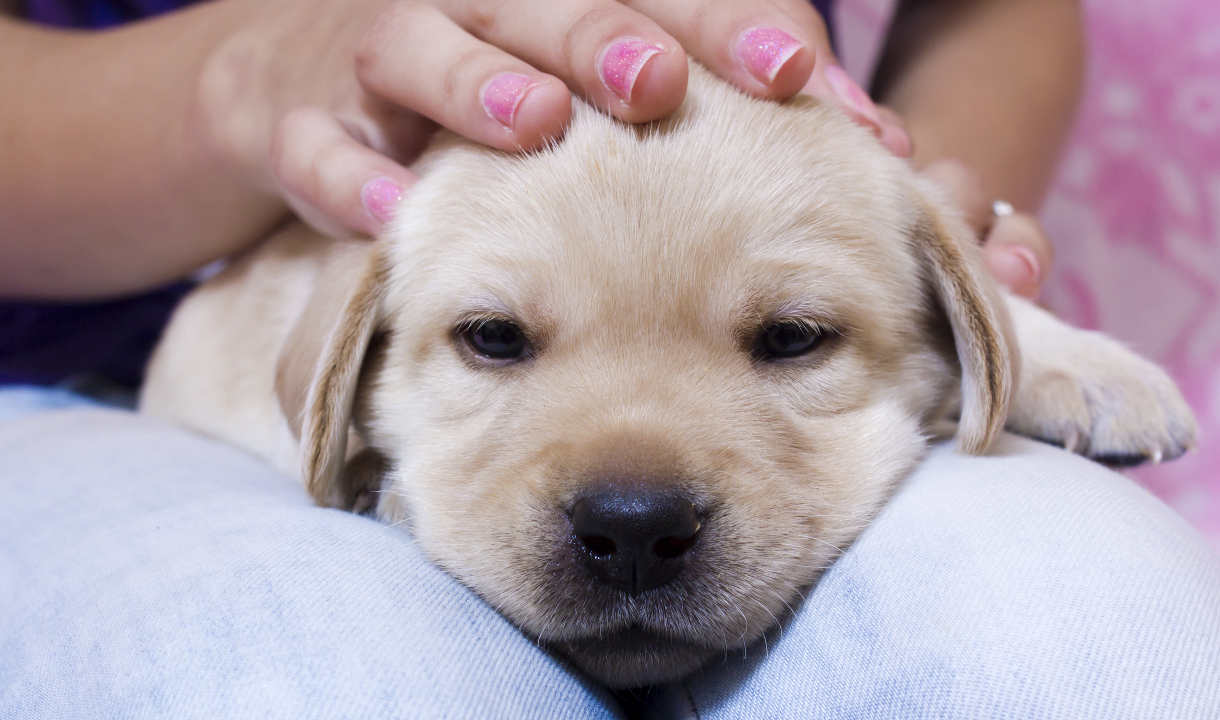
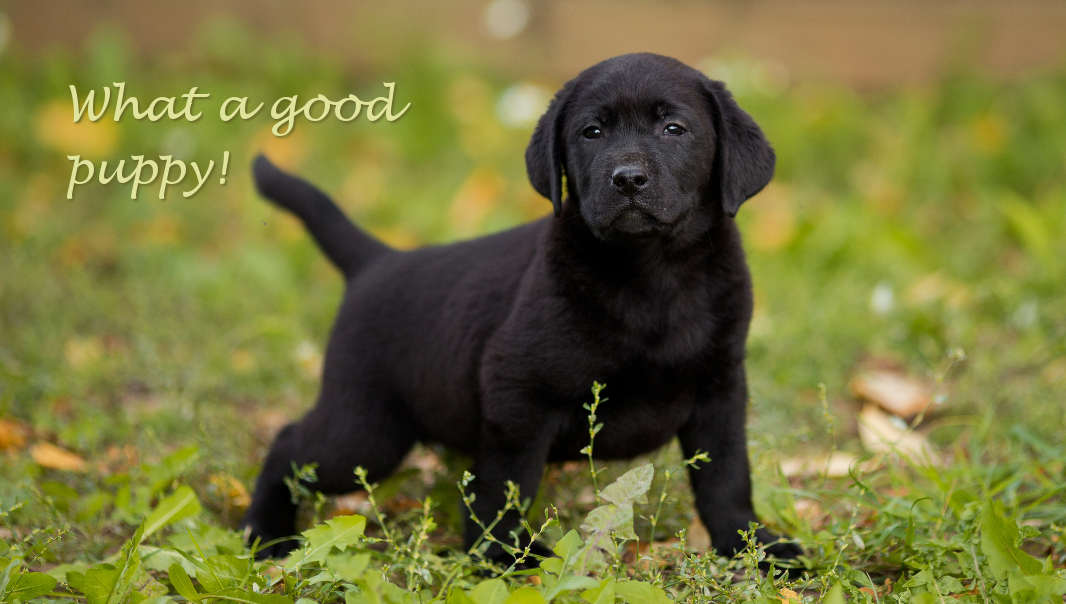
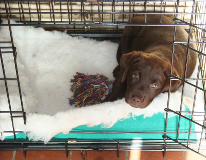
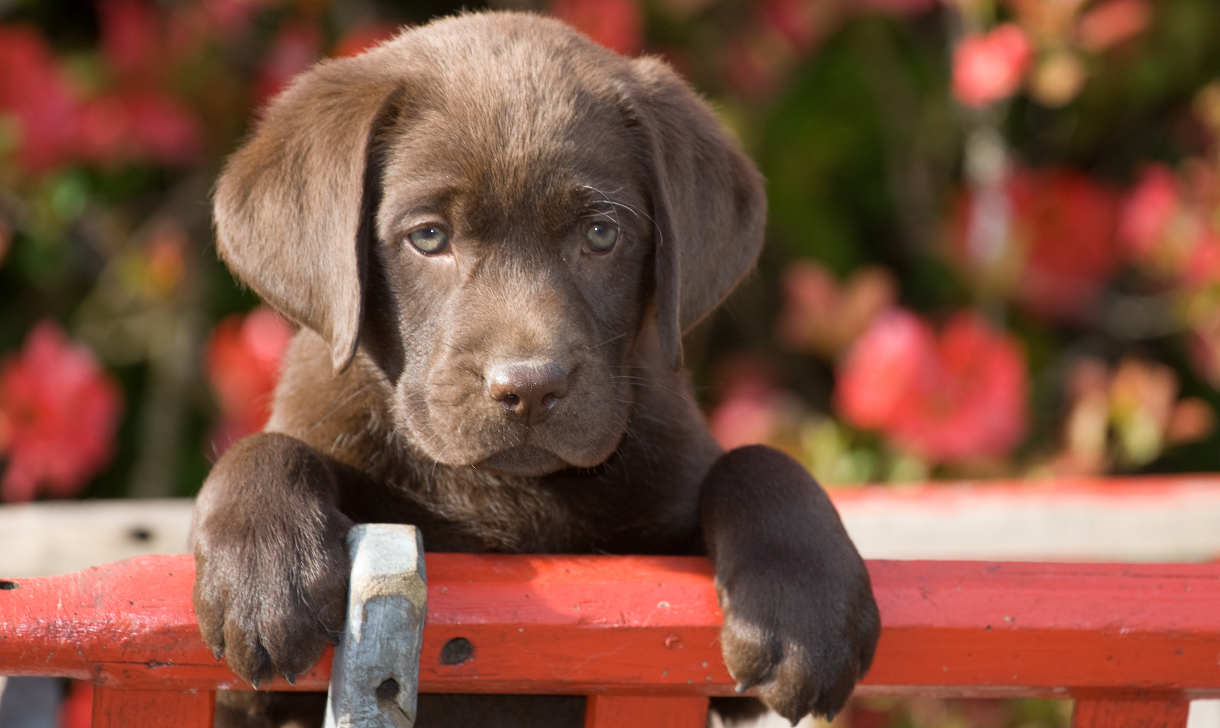
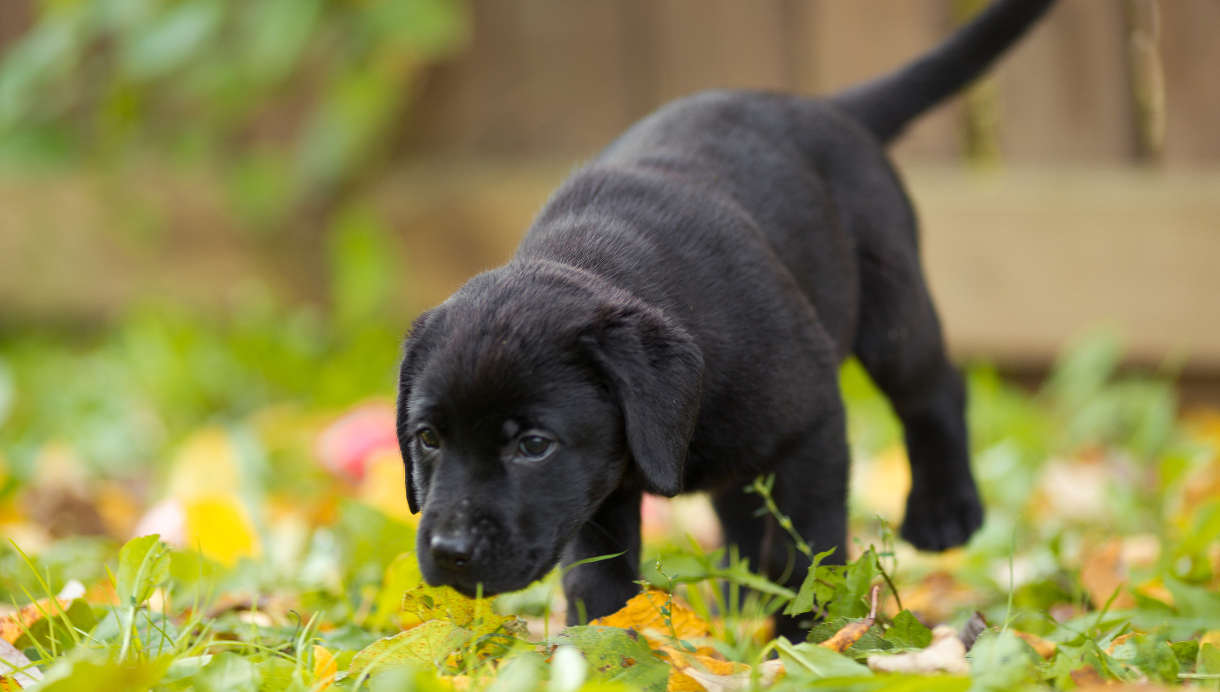
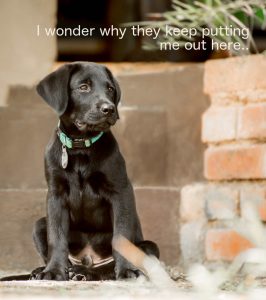
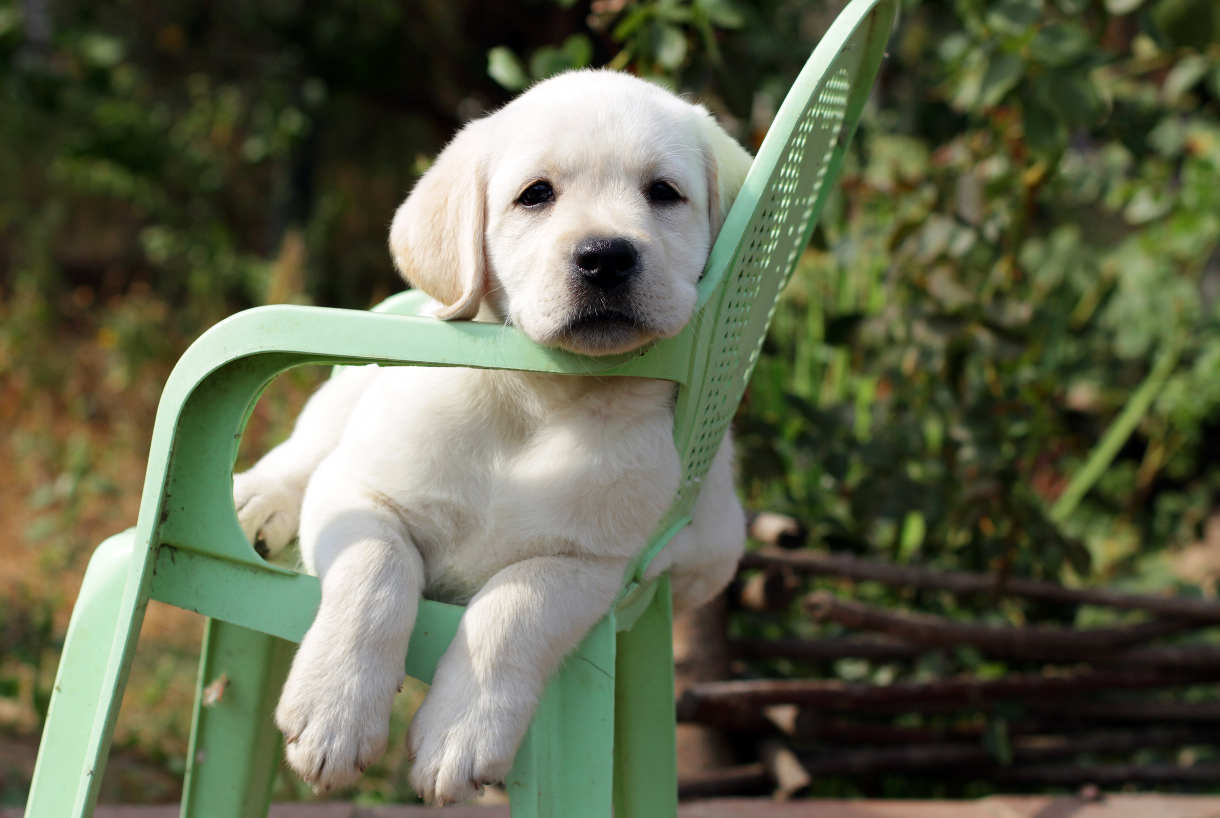
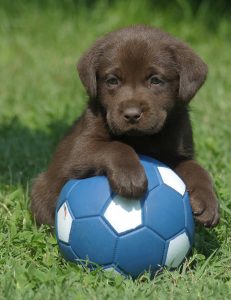

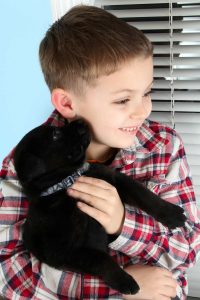

My six month old Labrador puppy is ripping up my garden lawn very bad I have tried everything.Also her pee is bright yellow she is on kibble dried food ,was told it is a good thing to soak it in water .I am not convinced.
Hi I have a 17 week old lab puppy who was doing fairly well with potty training and even signaling he had to go by going to the back door and sitting, ringing the bell or looking at us. About a month ago I started to leave the back door open for about 5 minutes so he could potty at will this was about every hour. Now if the door is closed he doesnt singal us he just walks over to the door and pees, like he’s not even trying to hold it to go out. I know you mentioned this so how to I fix this behavior? Thanks
Hi Pipa, we just welcomed our little Bella, 9 weeks old yellow lab. She is a cutie ! And did not have so much accidents but it is still early. I go with her outside all the time to train her and I try to train her to poo always in the same place in the garden. Would you have any tricks or advices to give to help that ?!? Thank you !
I have a 9 week old lab which I has been with us for a week. He has learnt to pee and poor outside, can last all night in his crate, sits by the door when he wants to toilet etc. We have done this by frequently taking him out at the right times and praising him etc. I have also started training him to sit using the staged process on this site. Unfortunately he seems to be interpreting the praise I give for sitting as a queue to pee. This is now the the only time that he will pee in the house. I recognise I need to break the connection that has been made between praise and peeing, and intend to start to use a cue word for when he is toiletting and to postpone any other training while I sort this out. Am I doing the right thing and/or what else should I be doing?
I’ve been following all of the advice I’ve read here, or so I thought. But I am not having luck. I have a 14 wk old lab who I crate at night and when I can’t watch her. She has a large pin that she can use for potty that is outside and she has access to everyday all day while she is not in the crate. Even with the access, she will still randomly squat down and go potty. I’ve interrupted her and brought her outside, I’ve done the stern “NO!” And I’ve praised her when she goes potty outside or in her designated spot. She gets excited when she is praised. Yet, she still goes inside and anywhere, even one time on frunature. I’ve only had her 3 weeks, I don’t know if it’s because she’s new still and didn’t get proper training before or if I’m not cleaning right (laminated floors 100 percent through the house) or what is going on. Any advice?
I should add, she also goes on long walks and gets a lot of play time in.
Hi Pippa
I would welcome some advice. Our 6month old pup has started pooing in his crate every morning. He was initally easy to train using your method however we have had this setback. He has his last meal at 7 and a short walk at 10 when he sometimes poops, then goes into his crate. We get up at 7 and now for nearly a week has pooped in the crate even if he has been at 10. We adjusted his crate to make it a bit smaller again but it didn’t make a difference many thanks Denise
Hi Pippa, Thank you for your Happy Puppy book an excellent website! We are in the process of preparing for our new puppy and reading everything we can. I understand how often a brand new puppy needs to wee but how often do they actually need to go poop? What is normal? Are the 2 a.m. potty trips in the first couple weeks going to be just wee or poop too? My partner really wants to use the potty bells or poochiebells for house training. What are your thoughts on these and do you think that we could incorporate them with your techniques? Thanks very much! Cheers, Jennifer
I have a 7 month old male chocolate labrador and have real problems with toilet training. We had him from 8 weeks and followed all the advice in terms of taking him outside after meals, a nap, play, every half hour etc, praising him and treating him when he went outside and not reacting to accidents etc. When we are there he will sit by the back door when he wants to go out. The problem we have is he is left on his own for 2 hours in the morning after I have gone to work and before my husband gets home and again in the afternoon. Some days he will be perfectly ok and other days he will wee and poo. Also he still isn’t dry over night. He goes out last thing about 10:00pm and my husband gets up for work at 5:00am, but there is always a wee and/or poo, but when he sometimes sleeps with us at the weekend he sleeps straight through so I know he can go all night without needing to go. I’ve gone back to basics with him so many times but nothing seems to be improving. Your advice on where we went wrong and what we can do would be appreciated. Many thanks
Dear Pippa
I have a lab puppy of 10 weeks and was given your Happy Puppy Handbook. I cannot recommend it enough to new puppy owners. Thank you so much for writing its, its is invaluable and my ‘bible’ at the moment
hi Pippa y does my puppy only poo in the house at nite i pick her food up at 4pm and usually go to bed about 10pm i let her out bout 830 -9pm so i no she doesn’t have to potty wake up and bam in my kitchen is a pile sometimes 2 help pls
How old is your puppy Jaymie?
Regarding the cue word, does it ever cause issues where a dog then doesn’t go to the toilet unless the word is said? We are getting a lab in 2 weeks and I would like to try out the cue word but my partner did wonder about that…
Hi Victoria, using a cue word doesn’t interfere with your dog going for a wee outdoors without you saying the word. Just as dogs that have been taught to ‘sit’ on cue, still sit at other times when they want to. But it is a reasonable question as putting annoying behaviours (like barking) on cue, can work to reduce the behaviour at other times. It probably depends on how ‘essential’ the behaviour is. 🙂 Good luck with your puppy.
I can’t speak highly enough of a cue word! We taught our boy to go when we say “quick quick” – it’s unique and we aren’t accidentally going to say it indoors! It was super easy to teach, we just said it every single time he went where we wanted him to. We still use it every time we see him go on his own just to be sure he understands what it means, and now if we take him outside and say it, he goes if he needs to. If he doesn’t, we try again a little while later. He’s also pretty good with following us around the house, and if we open the back door he’ll either hover around in the laundry (signaling he doesn’t need to go), or he’ll run outside (signaling he does).
We haven’t had a problem with accidents since he was three months old, he’s now eight and a half. He only feels comfortable going on the grass and thankfully he’s never gone on the carpet!
A cue word is a really good idea 🙂